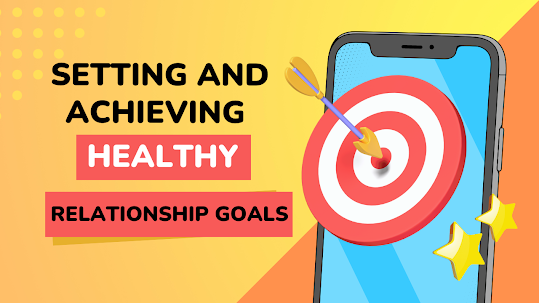Relationships are an integral part of our lives, and setting and achieving healthy relationship goals is crucial for long-term happiness and fulfillment. In this article, we will explore the significance of relationship goals, different types of goals, how to set them, and tips for successfully achieving them.
1. Introduction
Building and maintaining a healthy relationship requires
effort, commitment, and effective communication. Relationship goals serve as a
roadmap to guide couples on their journey toward a fulfilling partnership.
Whether you are in a new relationship or have been together for years, setting
and achieving these goals can strengthen your bond and enhance overall
satisfaction.
2. Understanding Relationship Goals
a. Definition of relationship goals
Relationship goals are the targets and aspirations that
individuals or couples set to improve their relationship dynamics. These goals
can cover various aspects, such as personal growth, communication, trust,
intimacy, and shared experiences.
b. Importance of setting goals
Setting relationship goals provides clarity, direction, and
motivation. They help partners align their visions and work together towards a
common purpose. By having well-defined goals, couples can nurture their
connection, overcome challenges, and build a stronger foundation for a healthy
and lasting relationship.
3. Types of Relationship Goals
a. Personal growth goals
Personal growth goals focus on individual development within
the relationship. These goals can involve pursuing new hobbies, advancing
career prospects, or improving mental and physical well-being. By encouraging
personal growth, partners support each other's aspirations, fostering a sense
of independence and self-fulfillment.
b. Communication goals
Effective communication is vital for any relationship.
Communication goals can include active listening, expressing emotions honestly,
and resolving conflicts constructively. By working on communication skills,
couples can ensure mutual understanding, reduce misunderstandings, and maintain
a healthy dialogue.
c. Trust and intimacy goals
Trust and intimacy are the foundation of a healthy
partnership. Goals related to trust can involve building transparency,
maintaining reliability, and honoring commitments. Intimacy goals may revolve
around deepening emotional connections, exploring physical affection, and
nurturing a satisfying sexual relationship.
4. How to Set Relationship Goals
a. Reflect on your values
Start by reflecting on your personal values and the values
you want to uphold within the relationship. Understanding what is important to
you will help you set meaningful and fulfilling goals that align with your core
beliefs.
b. Identify areas of improvement
Assess the current state of your relationship and identify
areas that require improvement. This could include areas such as communication,
trust, emotional support, or shared responsibilities. Identifying these areas
will allow you to create targeted goals for growth.
c. Set SMART goals
When setting relationship goals, ensure they are Specific,
Measurable, Achievable, Relevant, and Time-bound (SMART). For example, instead
of setting a vague goal like "improve communication," a SMART goal
would be "have a weekly date night to discuss any concerns or issues
openly."
5. Tips for Achieving Relationship Goals
a. Regular communication
Open and honest communication is crucial for achieving
relationship goals. Regularly discuss progress, challenges, and adjustments
needed to stay on track. Maintain an atmosphere of trust and understanding to
foster effective communication.
b. Collaboration and compromise
Successful relationships require collaboration and
compromise. Work together as a team, respecting each other's perspectives and
finding mutually beneficial solutions. Embrace flexibility and adaptability to
navigate unforeseen circumstances.
c. Celebrate milestones
Acknowledge and celebrate the milestones achieved along the
way. Whether it's overcoming a challenge, reaching a shared goal, or experiencing
personal growth, celebrate these accomplishments as a couple to foster
motivation and satisfaction.
6. Common Challenges and How to Overcome
Setting and achieving relationship goals can come with its
fair share of challenges. These may include differing priorities, external
pressures, or unexpected obstacles. To overcome these challenges, maintain open
lines of communication, practice empathy, seek professional guidance if needed,
and always remember the importance of teamwork.
7. Conclusion
Setting and achieving healthy relationship goals is an
ongoing process that requires commitment, dedication, and mutual effort. By
understanding the different types of goals, employing effective strategies, and
embracing growth together, couples can create a fulfilling and lasting
relationship. Remember, the journey is as important as the destination, and by
setting and achieving these goals, you can build a stronger and more satisfying
partnership.
FAQs (Frequently Asked Questions)
1. How do relationship goals contribute to a healthy partnership?
Setting relationship goals provides direction, motivation,
and a shared purpose, leading to enhanced communication, trust, and overall
relationship satisfaction.
2. Can relationship goals change over time?
Absolutely! As individuals grow and evolve, relationship
goals may shift to accommodate new aspirations, challenges, and stages of life.
Regularly revisiting and adapting goals is essential for long-term success.
3. What if my partner and I have different goals?
Differences in goals are normal and can provide an
opportunity for open and respectful dialogue. Find common ground, seek
compromise, and explore how individual goals can coexist harmoniously within
the relationship.
4. Are relationship goals only for romantic relationships?
While relationship goals are commonly associated with
romantic partnerships, they can also apply to friendships, family
relationships, and professional connections. The principles of setting and
achieving goals remain applicable across various types of relationships.
5. Can professional guidance help in setting and achieving relationship goals?
Yes, seeking professional guidance from therapists or
relationship coaches can offer valuable insights, tools, and strategies to help
you set and achieve your relationship goals effectively.






.png)






0 Comments